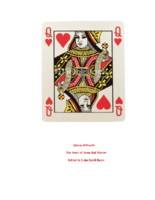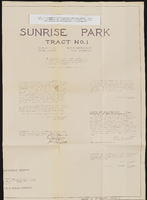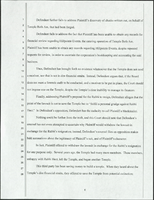Search the Special Collections and Archives Portal
Search Results
Thomas Hickey Political Papers
Identifier
Abstract
The Thomas Hickey Political Papers (1964-1996) contain the professional files of Hickey’s career as a Nevada State Assemblyman and Senator. Materials include constituent correspondence, voting records, memoranda, newspaper clippings, bills, and research documentation on topics such as the Yucca Mountain Nuclear Waste Repository, the Equal Rights Amendment (ERA), education, health, prisons, finance, and Nevada infrastructure. The collection highlights Hickey’s role on committees including finance, transportation, government affairs, and ways and means.
Archival Collection
John Levy Lighting Productions, Inc. Records
Identifier
Abstract
The John Levy Lighting Productions, Inc. Records (approximately 1990-2022) contain correspondence, invoices, contracts, expense reports, newspaper and magazine clippings, photographs, slides, and digital files detailing the development of various projects primarily in Las Vegas, Nevada. The records also contain architectural lighting drawings, electrical schematics and design details, conceptual sketches, and artist renderings of projects in Las Vegas, throughout United States, and various international locations.
Archival Collection

Transcript of interview with Anna Sipl Meyers by Leita Kaldi Davis, February 12, 2012, February 29, 2012, March 27, 2012, April 6, 2012, April 24, 2012, May 3, 2012, May 9, 2012, May 16, 2012, October 19, 2012, November 16, 2012, & December 7, 2012
Date
Archival Collection
Description
From concentration to ownership of Las Vegas casinos, Meyers owned the Cashbah and the and Queen of Hearts in downtown Las Vegas. Interview dates: 2/12/2012, 2/29/2012, 3/27/2012, 4/16/2012, 4/24/2012, 5/3/2012, 5/9/2012, 5/16/2012, 10/19/2012, 11/16/2012, 12/7/2012.
Text

Interview with Kenneth Giles, February 10, 2005
Date
Archival Collection
Description
Text

Angela Castro oral history interview: transcript
Date
Archival Collection
Description
Oral history interview with Angela Castro conducted by Stefani Evans, Cecilia Winchell, Kristel Peralta, Vanessa Concepcion, and Ayrton Yamaguchi on November 05, 2020 for the Reflections: The Las Vegas Asian American and Pacific Islander Oral History Project. Castro begins the interview by talking about her early life, childhood, what Guam was like, and the history of her parents and grandparents. She describes the difference in public and private education in Guam and compares it to the United States. She explains the reason why she moved to Las Vegas, Nevada in 1998 and attended the University of Nevada, Las Vegas for public relations. Castro then talks about the differences between older and newer generations, the political atmosphere in Guam, and the differences between the United States and Guam in politics. She also talks about the discrimination she has experienced throughout her life and diversity in the workplace. Lastly, she describes her culture and traditions during holidays, the struggles with an absence of culture within her family, and her personal religious beliefs.
Text

Amber Diskin oral history interview: transcript
Date
Archival Collection
Description
Oral history interview with Amber Diskin conducted by Barbara Tabach on January 5, 2018 for the Remembering 1 October Oral History Project. In this interview, Amber Diskin discusses her experience at the Route 91 Harvest music festival during the October 1, 2017 mass shooting in Las Vegas, Nevada. Diskin talks about finding her way home after escaping the crowds and letting her family and friends know she was not hurt. She speaks of the aftermath of the shooting, including how her children were affected, the post-traumatic stress disorder she developed, and how the shooting has affected her love of concerts. As a native Nevadan, she shares her views of Las Vegas and how her sense of community deepened after this event. Diskin ends the interview by discussing her appreciation for the first responders and the gift baskets she helped distribute to hospitals, police stations, and the fire department.
Text
San Pedro, Los Angeles & Salt Lake Railroad Company Records
Identifier
Abstract
The collection is comprised of records of the San Pedro, Los Angeles & Salt Lake Railroad Company (1901-1976). The construction of this railroad led to the founding of Las Vegas, Nevada and the creation of the Empire Construction Company and Las Vegas Land and Water Company. The records document the company's operations and include correspondence and contracts relating to lots in the Las Vegas townsite, payments and accounts, invoices and other audit materials from 1905 to 1923. The collection also includes the records of the railroad agent at Arden Station, located ten miles south of the Las Vegas Station, which contain correspondence, ledgers, freight and way bills, shipping orders, and telegrams.
Archival Collection
Jean Ford Photograph Collection
Identifier
Abstract
The Jean Ford Photograph Collection (1964-1977) contains black-and-white photographic prints, contact sheets, and transparencies of Nevada politician and activist Jean Ford. The collection includes photographs of Jean Ford with the Nevada State Park Commission and various Nevadan politicians; Ford lecturing and campaigning; and of the 1977 National Women's Conference in Houston, Texas.
Archival Collection


